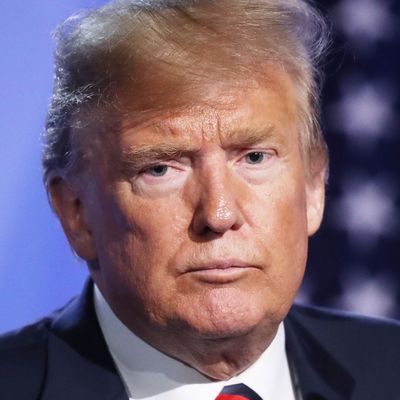
By now, it is beyond cliché to say that Donald Trump approaches his presidency (and/or entire existence) as though it were a reality-television show. But like Trump’s political career itself, that analogy is forever forcing its way into one’s consciousness, no matter how tired and irritating it has become.
Take Trump’s diplomacy with North Korea. The president would surely like Pyongyang to forfeit its nuclear arsenal, all things being equal. But, at the end of the day, achieving that security objective was less important to the president than broadcasting a story in which the greatest deal-maker in human history achieved peace through strength.
So, Trump engineered an interpersonal feud, ratcheted up tensions until they reached a fever pitch, and then manufactured a spectacular resolution in which the North Korean “nuclear threat” was finally resolved, thanks to his own unprecedented toughness and negotiating skills.
The fact that North Korea had not actually agreed to meet the Trump administration’s stated demands did not matter — that dissonant bit of footage could be left on the cutting room floor.
And this week in Brussels, Trump applied the same formula to his negotiations with NATO. The plot of the president’s latest diplomatic episode was simple: A politically incorrect, unapologetically nationalist president tells hard truths to America’s effete, European allies; scandalizes media and political elites alike; before, ultimately, forcing NATO to do right by the forgotten men and women of the United States.
Trump kicked things off with an explosive cold open, deriding Germany as a “captive” of Russia — and the other NATO nations as “delinquent” on their military spending — at a breakfast meeting on the summit’s first day.
These hard truths were, of course, false. Trump’s claim that Germany was fatally undermining NATO by purchasing natural gas from Russia — and thus rendering itself reliant on the very power it was asking America to defend it against — was grossly hyperbolic. While a pending pipeline that will deliver Russian gas to Germany is a source of genuine controversy within the alliance, Angela Merkel’s country relies on Russia for only 9 percent of its energy consumption. Her government’s dealing with Gazprom will not change the balance of military and economic power between NATO and Putin’s regime.
Further, NATO nations are in no sense “delinquent” on their promises to shoulder a greater portion of the cost of their defense. Trump repeatedly suggested that NATO member states had promised to increase their military spending to 2 percent of their respective gross domestic products but had neglected to do so — thereby forcing the United States to increase its spending on their defense, and thus, accruing debts to the U.S. that must be paid back. In reality, NATO nations had agreed to increase their military spending to that 2 percent figure by 2024.
Nevertheless, Trump’s mendacious allegations served to establish the righteousness of our hero’s quest. And the president preceded to raise the temperature on the conflict he’d created, announcing in a closed-door meeting that the 2 percent target was insufficient — fairness required all NATO members to spend 4 percent of their GDPs on defense (the United States currently spends just 3.57 percent of ours on our military).
Finally, in the summit’s closing hours, Trump brought matters to a climax.
In a morning meeting on the security challenges facing Georgia and Ukraine — two economically insecure nations that have been invaded by Russia within the last decade — Trump announced that if America’s NATO partners did not all hit the 2 percent defense spending target by next January, the United States “would go it alone.” The moment sent “everyone into a tailspin,” one diplomat told the Washington Post. Had the U.S. president just threatened to withdraw from NATO if every European democracy did not succeed in passing drastic budgetary changes by the end of the year? Could Georgia and Ukraine still rely on American military might to keep them safe from Russian imperialism? Could this be the beginning of the end of NATO, as we’ve known it???
Cut to break.
The meeting disbanded and an “emergency budget” session ensued. Then, the American president emerged from those last-minute negotiations, stood before a crowd of flashing cameras and anxious reporters, and announced that all had been set right.
“I told people that I’d be very unhappy if they did not up their commitments very substantially,” Trump said. “They are going to up it at levels never thought of before.”
The president went on to clarify that America’s NATO allies had not merely reaffirmed their commitment to reaching the 2 percent target by 2024, but that said target “will be going up quite a bit higher than that.”
Trump said he took “total credit” for this unprecedented diplomatic breakthrough. He then reassured a worried world, “I believe in NATO” — suggesting that all of his criticism of the alliance was really a form of tough love: “I think NATO is much stronger now than it was two days ago,” he declared.
Asked if he would pull an about-face on his plane flight out of Brussels, and tweet some disavowal of the joint statement he had signed — as he had done following last month’s G7 meeting — Trump replied that he actually never did things like that because “I am a very stable genius.”
Shortly after Trump’s remarks, French president Emmanuel Macron informed reporters that the NATO allies had not agreed to raise their previously established targets on defense spending. “There is a communique that was published yesterday. It’s very detailed,” Macron told the Associated Press. “It confirms the goal of 2 per cent by 2024. That’s all.”
Alas, Macron’s remarks did not make the final cut.






























